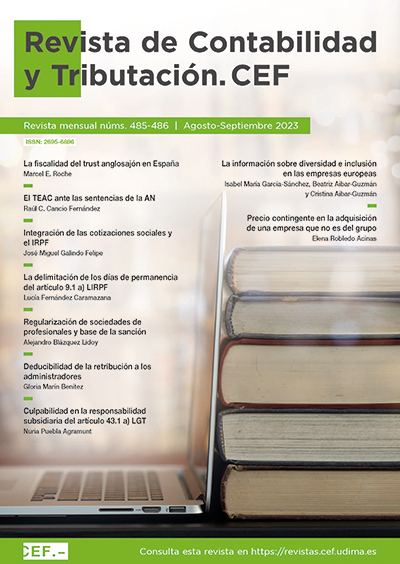La fiscalidad del trust anglosajón en España
DOI:
https://doi.org/10.51302/rcyt.2023.19101Palabras clave:
trusts, fiscalidad directa, impuesto sobre la renta, transparencia fiscalResumen
El trabajo aborda la fiscalidad del trust anglosajón en la familia del derecho civil o continental. El objeto principal es analizar los principios que fundamentan las normas de atribución de rentas derivadas a través del trust. Por tanto, haremos, en primer lugar, un análisis sobre el concepto de trust para definir cómo funciona dicha figura. En segundo lugar, analizaremos la recepción del trust en los países de derecho civil con el propósito de determinar cómo el derecho privado entiende al trust. Hay países que lo adaptaron a los principios de derecho civil, mientras que otros lo rechazaron completamente por considerar que es incompatible con los mismos. Ante esta problemática, analizamos, en tercer lugar, cómo el derecho fiscal se apoya en el derecho privado para gravar las rentas derivadas a través del trust, pero desarrolla sus propios principios para cumplir con la finalidad del derecho fiscal, es decir, gravar las rentas sobre la base de la capacidad contributiva del perceptor y la prevención de la evasión fiscal. Por último, haremos un análisis de las normas fiscales españolas para demostrar cómo dichas normas están orientadas a cumplir con esos dos objetivos.
Descargas
Citas
Avi-Yonah, R. (2007). International Tax as International Law. Cambridge University Press.
Brabazon, M. (2020). International Taxation of Trust Income. Cambridge University Press.
Braun, A. (2015). The State of the Art of Comparative Research in the Area of Trusts. Legal Research Papers Series. Paper No. 61/2015. University of Oxford.
Cámara Lapuente, S. (1999). Operaciones fiduciarias o trusts en Derecho español. Revista Crítica de Derecho Inmobiliario, 1757.
Checa Martínez, M. (1998). El trust angloamericano en el Derecho español. McGraw-Hill.
Dagan, T. (2017). The Global Market for Tax and Legal Rules. Florida Tax, 21(1).
Delgado Pacheco, A. (2012). Las entidades en atribución de rentas y el régimen fiscal de partnerships y trusts en España. Manual de Fiscalidad internacional. (2.ª ed.). Instituto de Estudios Fiscales.
Emmerich, Y. (2009). Les fondements de la fiducie française face ay trust de la common law: entre droit des contrats et droit des biens. RIDC 2009/1.
Frenette, F. (1985). La propriété fiduciaire. Les Cahiers de droit, 26(3), 727–737.
Garrigues, J. (1953). Law of Trusts. The American Journal of Comparative Law, 2(1).
Goldschmidt, R. (1961). The Trusts in the Countries of Latin America. Inter-American Law Review, 3.
Graziadei, M. (2003). The Functionalist Heritage. Comparative Legal Studies: Traditions and Transitions. (Eds. P. Legrand and R. Munday). Cambridge University Press.
Gretton, G. (2000). Trusts without Equity. International and Comparative Law Quarterly, 49.
Grimaldi, M. (1991). La fiducie: réflexions sur l’institution et sur l’avant-projet de la loi qui la consacre. Rep. Défrenois.
Hernández González-Barreda, P. (2020). Beneficial Ownership in Tax Law and Tax Treaties. Hart Publishing.
Ho, L. (2013). Trusts: The Essentials. The Worlds of the Trust. (Ed. L. Smith). Cambridge University Press.
Hofri-Winogradow, A. (2016). The Demand for Fiduciary Services: Evidence from the Market in Private Donative Trusts. Hebrew University of Jerusalem Legal Studies Research Paper Series No. 16-36.
Lepaulle, P. (1957). Reflections on the Expansion of Trusts. The American University Law Review, 6.
Maitland, F. (1894). The Origin of Uses. Harvard Law Review, 8(3).
Marini, M. (2008). Rapport au Sénat Nº 442 . Senado de Francia.
Penner, J. (2010). Resulting Trusts and Unjust Enrichment: Three Controversies. En C. Mitchell (Ed.), Constructive and Resulting Trusts. Oxford.
Sitkoff, R. H. (2019). Fiduciary Principles in Trust Law in Trust Law. En Evan J. Criddle, P. B. Miller y R. H. Sitkoff (Eds.), The Oxford Handbook of Fiduciary Law (capítulo 3). OUP.
Smith, L. (2009). Trust and Patrimony. Revue générale de droit, 38.
Sterk, S. E. (2000). Asset Protection Trusts: Trust law’s Race to the Bottom? 85 Cornell Law Review 1035, 1.040-1.041.
Trost, A. y Arribas, D. (2019). El trust en la fiscalidad internacional. En F. Serrano Antón, Fiscalidad internacional (capítulo 36). CEF.
Virgós Soriano, M. (2006). El trust y el derecho español. Thomson Civitas.
Wright, L. A. (1967). Trusts and the Civil Law – A Comparative Study. Western Ontario Law Review, 6.
Wulf, C. de. (1965). The Trust and Corresponding Institutions in the Civil Law. Bruylant.
Zenati-Castaing, V. y Revet, T. (2008). Les biens. PUF.















